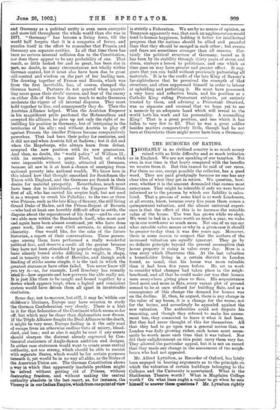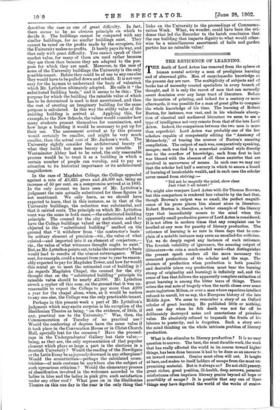THE HUMOURS OF RATING.
PROBABLY in no civilised country is so much money raised with so little difficulty and so much irritation as in England. We are not speaking of our taxation. Not even in war time is that heavy compared with the benefits we receive from it. But this cannot be said of our rates. For them no one, except possibly the collector, has a good word. They are paid grudgingly because no one has 'any clear idea of what they get in return. We question, how- ever, whether it is the amount demanded that causes most annoyance. That might be tolerable if only we were better informed as to the process by which our liability is calcu- lated. That a process of some kind is at work Londoners, at all events, know, because every five years there comes a quinquennial valuation, and the almost universal experi- ence is that the effect of this is to increase the rateable value of the house. The tree has grown while we slept. We went to bed in a house worth so much a year, we wake up in one worth ever so much more. Not one of us can say what rateable value means or why in a given case it should be greater to-day than it was five years ago. Moreover, there is some reason to suspect that the authors of the increased valuation are equally ignorant. They go by no definite principle beyond the general assumption that house property is rising in value every day. Here is a true story which illustrates this. At the last valuation a householder living in a certain district in London found, as usual, that his house was more valuable than it had been five years before. He set to work to consider what changes had taken place in the neigh- bourhood, and all that he could make out was that houses were everywhere giving place to flats. His acquaintance lived more and more in flats, every vacant plot of ground seemed to be at once utilised for building flats, and as a consequence of this change the demand for houses was on the decline. If, then, he argued, there is any change in the value of my house, it is a change for the worse, not for the better, and accordingly he appealed against the new valuation. The authorities could not dispute his reasoning, and though they refused to make his- assess- ment less, they consented to leave it what it had been. But they had never thought of this for themselves. All that they had to go upon was a general notion that, as London was daily growing richer, each howl° must neces- sarily be worth more each time that it was valued. Nor did their enlightenment on this point carry them very far. They allowed the particular appeal, but it is not on record that they made any change in the assessment of the neigh- bours who had not appealed.
Mr. Alfred. Lyttelton, as Recorder of Oxford, has lately been engaged in hearing arguments as to the principle., on which the valuation of certain buildings belonging to the Colleges and the University is ascertained. What is the Sheldonian Theatre worth? What is Magdalen College worth ? On what lines ought a valuer to go when he sets himself to answer them questions P Mr. Lyttelton rightly describes the case as one of great difficulty. In fact, there seems to be no obvious principle on which to decide it. The buildings cannot be compared with any similar buildings, for no similar buildings exist. They cannot be rated on the profits made by the occupiers, for the University makes no profits. It barely pays its way, and that only with great difficulty. You cannot speak of their market value, for many of them are used rather because they are there than because they are adapted to the pur- pose for which they are used. Moreover, in the case of some of the University buildings the University is the only possible tenant. Before they could be of use to any one else they would have to be pulled down and rebuilt. It is not very easy for the layman to understand the basis of valuation which Mr. Lyttelton ultimately adopted. He calls it " the substituted building basis," and it seems to be this : The purpose for which the building the rateable value of which has to be determined is used is first ascertained, and then the cost of erecting an imaginary building for the same purpose is calculated. In this way the utility value of the existing building is arrived at. Applying this, for example, to the New Schools, the valuer would consider how many students present themselves for examination, and how large a building it would be necessary to put up for their use. The assessment arrived at by this process would certainly be smaller, and might be very much smaller, than the actual cost of Mr. Jackson's work. The University rightly consider the architectural beauty of what they build, but mere beauty is not rateable. if Westminster Abbey had to be rated, the only reasonable process would be to treat it as a building in which a certain number of people can worship, and to pay no attention to its historical importance or its architectural magnificence.
In the case of Magdalen College, the College appealed against a rate of £5,625 gross and £4,500 net, being an increase of 50 per cent. on a compromise arrived at in 1895. In the only account we have seen of Mr. Lyttelton's judgment the rate actually substituted for these figures is not mentioned. We only learn, as we should have expected to learn, that in this instance, as in that of the University buildings, the reduction was substantial, and that it carried costs. The principle on which Mr. Lyttelton went was the same in both cases,—the substituted building principle. The counsel for the city authorities asked to have the College buildings valued as they stand, and they objected to the " substituted building " method on the ground that " it withdrew from the contractor's basis' its solitary element of precision—viz., the value of what existed—and imported into it an element of conjecture,— viz., the value of what witnesses thought ought to exist." But, as Mr. Lyttelton points out, to take the contractor's basis would lead to results of the utmost extravagance. What rent, for example, could a tenant from year to year be reason- ably expected to pay for Magdalen Tower, and how far would this rental go to meet the estimated cost of building it ? As regards Magdalen Chapel, the counsel for the city thought that on the " substituted building " principle its rateable value should be nearly £2,000. Mr. Lyttelton struck a cypher off this sum, on the ground that it was un- reasonable to expect the College to pay more than £200 a year for the chapel alone, when, as it would be useless to any one else, the College was the only practicable tenant.
Perhaps in this present week a part of Mr. Lyttelton's judgment which may excite surprise is his exception of the Sheldonian Theatre as being, " on the evidence, of little, if any, practical use to the University." Was, then, the Commemoration of Tuesday of no practical use ? Would the conferring of degrees have the same value if it took place in the Convocation House or in Christ Church Hall, specially lent for the occasion ? Have the proceed- ings in the Undergraduates' Gallery lost their value,— being, as they are, the only representation of that popular element which plays so large a part in the elections in a Scottish University ? Would the reading of the Newdigate or the Latin Essay be as joyously drowned in any otherplace? Would the eccentricities—perhaps the calculated. eccen- tricities—of male costume be anywhere else the subject of such uproarious criticism ? Would the elementary process of classification involved in the welcomes accorded to the ladies in blue and the ladies in pink give such satisfaction under any other roof ? What goes on in the Sheldonian Theatre on this one day in the year is the only thing that links on the University to the proceedings of Commemo- ration Week. 'What, we wonder, could have been the evi- dence that led the Recorder to the harsh conchision • that the one building that imparts dignity to what would- other- wise be a miscellaneous assortment of balls and garden parties has no rateable value !



















































 Previous page
Previous page